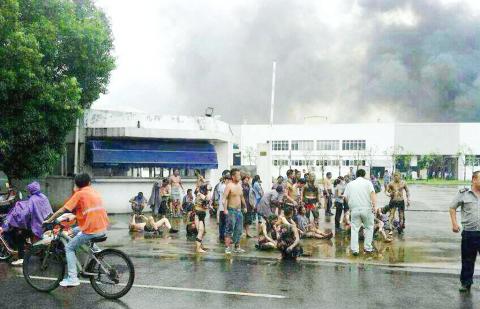An explosion killed at least 65 people and injured more than 120 at a factory in China that makes wheels for US carmakers, including General Motors Co, state media said, as the country suffered its worst industrial accident in a year.
Chinese media outlets cited the government as saying that the blast in the wealthy eastern province of Jiangsu occurred at about 7:30am yesterday in Kunshan City, after an explosion ripped through a workshop that polishes wheel hubs.
An initial investigation suggested that the blast at Kunshan Zhongrong Metal Products Co Ltd (昆山中榮金屬) was caused by negligence after a flame was lit in a dust-filled room, Xinhua news agency said.

Photo: EPA
Kunshan Zhongrong Metal Products is a company run by Taiwanese Wu Chi-tao (吳基滔), who serves as the company’s chairman, according to a report by the Chinese-language United Evening News yesterday. The company, which has US$8.8 million in registered capital, has 450 workers in China, the report said.
Two officials from Kunshan Zhongrong have been held by authorities, Xinhua reported, citing an unnamed government source.
Images online and on television showed large plumes of black smoke billowing from a white low-rise building. Many of the injured, who appeared badly burnt and in scorched clothing, were shown laying on wooden pallets and being stretchered on to trucks, public buses and ambulances.
At the workshop where the blast occurred, television reports showed images of wrecked walls and heavy machinery that had been hurled through the window.
Beijing said online that Chinese State Councilor Wang Yong (王勇) was heading to the site at the request of Chinese President Xi Jinping (習近平) and Chinese Premier Li Keqiang (李克強).
Kunshan Zhongrong could not be reached for comment.
Television reports said that there were more than 200 workers at the site when the explosion struck, and 45 died immediately.
No Taiwanese nationals were reported dead in the explosion and the cause of the incident is still under investigation, Chinese media reports said.
The Straits Exchange Foundation (SEF), Taiwan’s semi-official body for handling cross-strait exchanges, extended condolences later in the day.
SEF spokesman Ma Shaw-chang (馬紹章) said the foundation would do everything it could to help the firm.
He said that Wu was “very upset” about the incident, but has not yet asked for assistance from Taiwan.
The foundation said it has called its Chinese counterpart, the Association of Relations Across the Taiwan Straits, to express sympathy.

MAKING WAVES: China’s maritime militia could become a nontraditional threat in war, clogging up shipping lanes to prevent US or Japanese intervention, a report said About 1,900 Chinese ships flying flags of convenience and fishing vessels that participated in China’s military exercises around Taiwan last month and in January last year have been listed for monitoring, Coast Guard Administration (CGA) Deputy Director-General Hsieh Ching-chin (謝慶欽) said yesterday. Following amendments to the Commercial Port Act (商港法) and the Law of Ships (船舶法) last month, the CGA can designate possible berthing areas or deny ports of call for vessels suspected of loitering around areas where undersea cables can be accessed, Oceans Affairs Council Minister Kuan Bi-ling (管碧玲) said. The list of suspected ships, originally 300, had risen to about

DAREDEVIL: Honnold said it had always been a dream of his to climb Taipei 101, while a Netflix producer said the skyscraper was ‘a real icon of this country’ US climber Alex Honnold yesterday took on Taiwan’s tallest building, becoming the first person to scale Taipei 101 without a rope, harness or safety net. Hundreds of spectators gathered at the base of the 101-story skyscraper to watch Honnold, 40, embark on his daredevil feat, which was also broadcast live on Netflix. Dressed in a red T-shirt and yellow custom-made climbing shoes, Honnold swiftly moved up the southeast face of the glass and steel building. At one point, he stepped onto a platform midway up to wave down at fans and onlookers who were taking photos. People watching from inside

Japan’s strategic alliance with the US would collapse if Tokyo were to turn away from a conflict in Taiwan, Japanese Prime Minister Sanae Takaichi said yesterday, but distanced herself from previous comments that suggested a possible military response in such an event. Takaichi expressed her latest views on a nationally broadcast TV program late on Monday, where an opposition party leader criticized her for igniting tensions with China with the earlier remarks. Ties between Japan and China have sunk to the worst level in years after Takaichi said in November that a hypothetical Chinese attack on Taiwan could bring about a Japanese

The WHO ignored early COVID-19 warnings from Taiwan, US Deputy Secretary of Health and Human Services Jim O’Neill said on Friday, as part of justification for Washington withdrawing from the global health body. US Secretary of State Marco Rubio on Thursday said that the US was pulling out of the UN agency, as it failed to fulfill its responsibilities during the COVID-19 pandemic. The WHO “ignored early COVID warnings from Taiwan in 2019 by pretending Taiwan did not exist, O’Neill wrote on X on Friday, Taiwan time. “It ignored rigorous science and promoted lockdowns.” The US will “continue international coordination on infectious